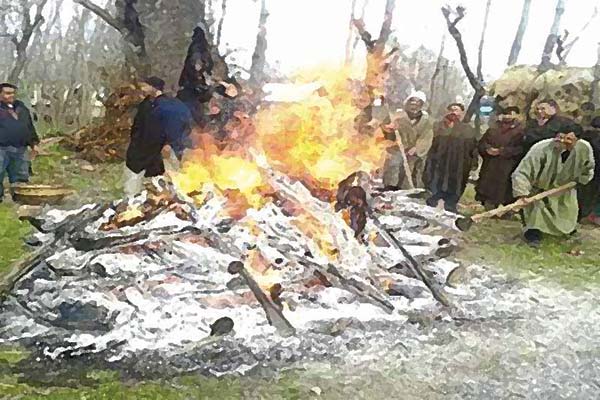Even after pricked and provoked by fringe elements time and again, Kashmir has upheld its tradition of communal harmony to the wonder of many, reports Mohammad Raafi

WAHIBUGH, Pulwama – This hamlet had no usual Eid celebrations this past fall. All celebrations ceased when the news of a pandit demise spread. Almost the entire hamlet shortly reached the house of Ramchand Koul—the pandit who never left his home, hearth, hamlet when majority in his tribe fled Kashmir.
Koul departed on the day of Eid-ul-Azha. From the daybreak itself before the celebrations would pick up in Wahibugh, the news spread and changed the mood. With his kith and kin away, the villagers volunteered for his last rites.
Some four hundred of them turned up for Koul’s cremation—performed strictly as per Hindu rituals. Later Koul’s son, Vinod was filled with the gratitude. “I mean it was Eid and everyone in the hamlet had a busy day out,” he says.“But even then, people of my hamlet left everything else behind to ensure proper cremation to my father. I am simply overwhelmed.”
The treatment didn’t last till cremation ground itself. Then, for days to come, Muslims of Wahibugh arranged tea, food and other things for the bereaved family.
But what was lately demonstrated at Wahiubugh was perceived as “a ray of hope” by MK Gandhi long back when the great partition was bleeding sub-continent quite bad. This sense of harmony remained unbroken—even when, Jammu enforced economic blockade on Kashmir during 2008 Amarnath land row besides blinding some Kashmiri truckers. Kashmiri Muslims only responded by feeding the Amarnath pilgrims.
Last 25 years threw a major challenge for Kashmiri Muslims often accused for Pandit migration in Delhi media. The response that came from Kashmir busted these media myths.
With Pandits away, their crematories across Kashmir were left without morticians, locally called Kawij. This left around 2000 odd Pandit families distressed. One such distressing moment gripped an elderly woman from Habba Kadal during 2010 street protests.
With Kashmir reeling under continuous curfews and curbs, not many knew that a pandit living in Habba Kadal’s Chinkral Mohalla had expired. The city was tense, so was the life itself. With media gagged, internet blocked and newspapers ceased, the communication crisis hit the city badly. Amid the crisis, the demise of Kishan Lal Puri who never migrated from Kashmir remained unheard.
But once a relaxation was given in curfew, almost the entire Chinkral Mohalla participated in Lal’s final journey. “What we did then was the sheer display of our tradition, humanity,” says Mushtaq, a local. “Muslims and Pandits have lived, grown up together here—even our religion teaches us to guard minorities. I don’t think we did anything extraordinary.”
It’s not just symbolic—as is being touted by certain quarters—but an immediate, spontaneous societal response. From arranging firewood to organising transport, local Muslims always threw their weight behind their Pandit brethren.
In the erstwhile hub of KPs, Habba Kadal, the remaining 5 to 6 Pandit households recall how Muslims were there for them when they “needed them the most”.
All these years, says Cham Lal, a Pandit putting up in Habba Kadal, “Muslims did everything for us. From performing religious rites to organising vehicles, and from informing police to carrying the body, they did it all by severing their own engagements.”
Last year when Bhola Nath Kachroo living in the area with his wife and a daughter died after an illness, none from his community was there to perform his last rites.
Muslims made all the arrangements for his last rites besides providing succour to the bereaved family for days to come.
“There was nobody to perform the burial,” says Lal, “before Muslim neighbours came forward voluntarily to cremate Kachroo.”
Lal’s immediate neighbour, Ghulam Mohammad Bhat, recalls many Pandit deaths in the area in recent times. “With Habba Kadal almost turning into ghost lanes,” he says, “only Muslims neighbours were there for the non-migrant Pandits.”
Bhat says the Muslims would gather and perform the last rites for Pandits without making it a faith issue. “We did turn as humans to help our mourning neighbours,” he says. “They didn’t leave when other Pandits fled and we owe responsibilities to take care of them.”
Back to Wahibugh. The locals assert the bond between Muslims and Pandits are unbreakable. “We stood by our Pandit brothers during militancy,” says Ghulam Rasool, Koul’s neighbour. “We have protected them like our brothers. There is no question of turning our backs ever to them.”















